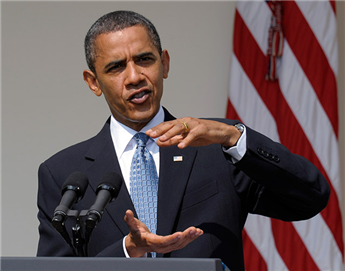Beyond Politics?

President Barack Obama makes a statement on the capping of the BP well in the Gulf, Friday, July 16, 2010, in the Rose Garden at the White House. AP
Energy: Oil firms have been lumped into one big, bad group by the U.S. drilling moratorium. But they're not all alike. BP's green politics played a big role in the Gulf spill. That's what should be repudiated, not drilling.
Collectivism is alive and well in the White House, which seeks to spread the price of its deepwater drilling moratorium across the oil industry and the Gulf's economy.
As if the April 20 BP oil spill weren't bad enough for the people of the Gulf, they now face a jobless future no matter what the environmental and safety record of their local companies.
This insanity was directly caused by the company with the loudest claims to environmental sensitivity — BP, whose Beyond Petroleum slogan sounded as if it didn't even believe in its product, oil.
And, apparently, it didn't.
No. 1, BP's been a big-foot lobbyist on Capitol Hill, spending $15.9 million to influence legislation — and not in the interest of producing oil. According to the American Thinker, BP played a key role in writing the economy-killing Kerry-Lieberman cap-and-trade bill that President Obama wants to ram through Congress.
"BP is a strong White House and Democratic ally on the cap-and-tax issue," wrote Brad O'Leary.
It also went green in the campaign sense, doling out cash to leftist candidates who opposed oil drilling.
Obama took more than any other candidate BP financed, $77,051, according to the Center for Responsive Politics.
BP and its employees gave more than $3.5 million to federal candidates over the past 20 years. Few were champions of producing oil.
The politics gets even seedier. Obama Chief of Staff Rahm Emanuel took a rent-free apartment from a BP consultant who helped create BP's sanctimonious "Beyond Petroleum" campaign.
Worse, news is out that the $20 billion BP fund to compensate residents of the Gulf ruined by the spill could mean tax savings for BP. BP's $5 billion yearly outlay over four years can be written off as a business expense, according to tax law cited by O'Leary.
None of the other oil companies shut down by the moratorium will get that. So in the wake of its disaster, BP gains.
Which is infuriating, given that BP's political activity against oil was accompanied by an astonishingly bad safety record compared with other oil companies.
An investigation by the Center for Public Integrity, using Occupational Safety and Health Administration records dating at least to 2005, found that two BP refineries account for 97% of all "flagrant" violations, with 760 of them classified as "egregious willful," along with 102 others. By contrast, ExxonMobil got a mere ... one.
Combine the green sanctimony (which activist groups like Greenpeace call green-washing) with the huge record of violations, and the common denominator is big politics.
Were leftist politicians protecting this company because it advanced a green agenda? That's sure what it looks like.
The most outrageous thing is that it adds up to a drilling moratorium for honest companies that believe in oil, respect its awesome power as it's extracted from Mother Earth, and handle it with the safety and respect it deserves.
Oil, in fact, is the greenest fuel because it's the most energy efficient and transportable. And remember: Standard Oil founder John D. Rockefeller saved more whales than all the green groups combined by replacing whale oil, once our staple fuel, with crude.
BP's teaming with anti-oil politicians whose regulators looked the other way on safety violations and then claiming to be green has been a disaster for the Gulf.
It's time to rethink the importance of oil to our economy — and
the damage Obama's outrageous moratorium has wrought on the honest
oil companies that make our standard of living possible.